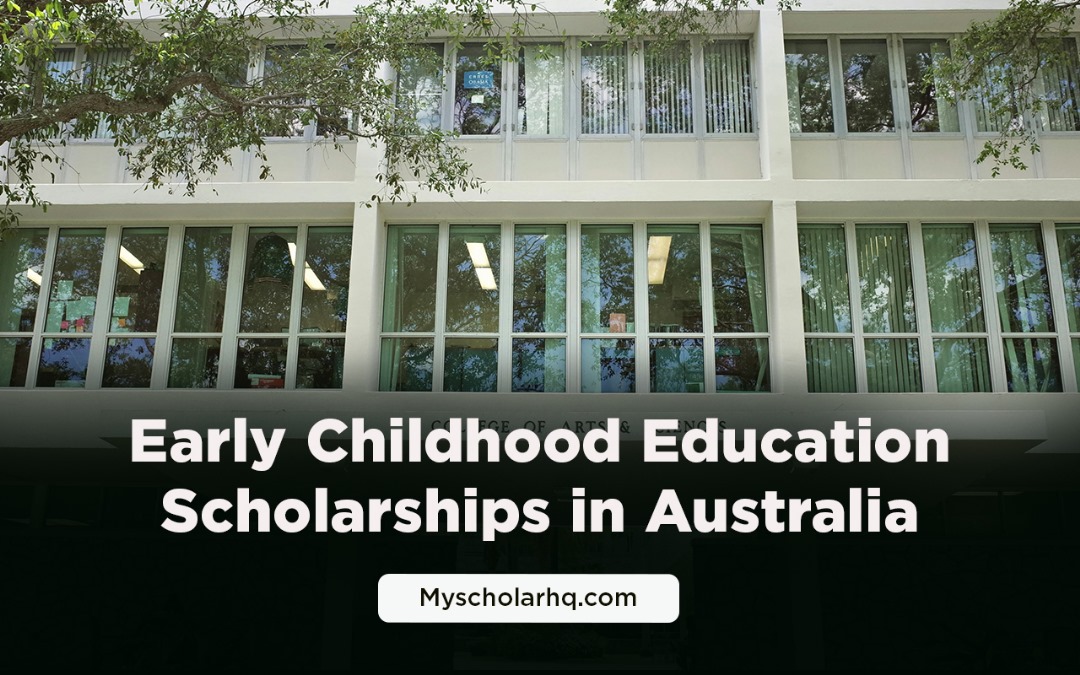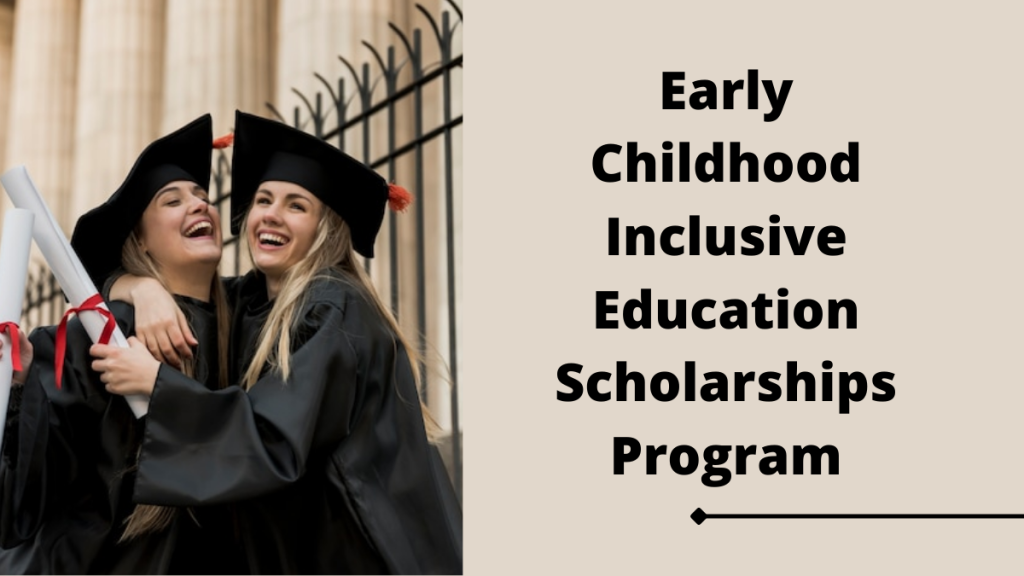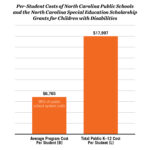
Unlocking Your Dream: My Journey Through Early Childhood Education Scholarships
I remember sitting there, a mug of lukewarm tea in my hands, staring out at the rain-streaked window. The brochure for the early childhood education program lay open on my lap, its glossy pages depicting smiling children and dedicated teachers. My heart swelled with a familiar longing. This was it. This was what I was meant to do – to nurture those first precious years, to help tiny humans discover the world, to lay the groundwork for a lifetime of learning. But then my eyes drifted to the tuition fees, a number that seemed to mock my aspirations, a mountain too steep for my modest savings to conquer. That moment, I felt a familiar pang of despair, a whisper of "maybe it’s not for me" trying to take root.
But I’ve always been a stubborn dreamer. I believed in the power of early learning, not just as a career, but as a calling. The thought of shaping young minds, of being a gentle guide in their earliest adventures, was too strong to simply abandon because of a price tag. I knew I couldn’t be the only one facing this hurdle. There had to be a way. And that’s when the whispers of "early childhood education scholarships" started to make their way into my orbit. It began subtly, a casual mention from a colleague, a flyer tacked to a community board, a quick search online that opened up a whole new world of possibilities. It was like finding a hidden path in a dense forest, a glimmer of light showing me the way forward.
My first step, after the initial wave of relief, was to get organized. I grabbed a fresh notebook – the kind with a pretty cover, hoping it would inspire me – and started jotting down everything. "ECE scholarships," I wrote at the top, underlining it twice. Then came the questions: Where do I look? What kind of scholarships are there? Am I even eligible? The journey to securing funding for my early childhood education degree wasn’t a sprint; it was a marathon, filled with research, applications, a few rejections, and a whole lot of hope.
I started with the most obvious place: the financial aid office at the university I hoped to attend. They were an absolute treasure trove of information, providing lists of institutional scholarships, state grants, and even pointing me towards national organizations. It turned out many universities offer specific early childhood education scholarships to attract dedicated students to their programs. These often consider academic merit, but also your passion, volunteer experience, and commitment to the field. I learned that showing you truly care about working with children, that you’ve already put in some effort, can make a huge difference.
Beyond the university walls, I ventured into the vast digital ocean. Google became my best friend. I typed in every variation I could think of: "scholarships for early childhood educators," "financial aid for preschool teachers," "child care scholarships," "grants for ECE degrees." It felt overwhelming at first, a never-ending scroll of links. But I learned to be discerning. I focused on reputable organizations, educational foundations, and government websites. I discovered that many non-profit organizations are deeply invested in strengthening the early childhood workforce and offer generous ECE scholarships to those pursuing degrees or professional development.
One particular avenue that yielded surprising results was local community organizations. I found a regional foundation that offered scholarships specifically for residents pursuing careers in education, especially in high-need areas like early childhood. These local opportunities are often less competitive than national ones, simply because fewer people know about them or bother to apply. It taught me a valuable lesson: don’t just look for the big names; sometimes the most impactful help comes from your own backyard.
As I delved deeper, I started categorizing the types of early childhood education scholarships I was finding. There were, of course, the merit-based scholarships, which rewarded strong academic performance. My grades weren’t perfect, but I had a solid GPA, so I applied for those, highlighting my commitment to my studies. Then there were the need-based scholarships, which were crucial for someone like me. These required me to fill out the Free Application for Federal Student Aid (FAFSA), a document that, while a bit daunting, unlocked access to federal grants and many university-specific funds. Never underestimate the power of the FAFSA; it’s the gateway to so much financial assistance.
I also stumbled upon scholarships for specific demographics or situations. Some were for first-generation college students, others for minority groups, or for those planning to teach in rural or underserved communities after graduation. There were even scholarships for individuals already working in early childhood settings who wanted to further their education – these are often called employer-sponsored scholarships or professional development grants. While I wasn’t working in the field yet, I realized how important it was to explore every niche. Each specific criteria could be an opportunity.
The application process itself was an education. It wasn’t just about filling out forms; it was about telling my story. Every scholarship application seemed to require an essay or a personal statement. This was where I truly had to dig deep and articulate why I wanted to be an early childhood educator. I wrote about my first vivid memory of caring for a younger cousin, the pure joy I felt watching a child grasp a new concept, the profound belief I held that the first five years are the most critical for human development. I poured my heart into those essays, trying to convey not just my ambition, but my genuine love for children and my dedication to the field.
I learned to tailor each essay. Instead of a generic "I love kids" statement, I researched the organization offering the scholarship. If they focused on literacy, I highlighted my passion for introducing children to books. If they championed play-based learning, I shared anecdotes about how I believed children learn best through exploration and discovery. This wasn’t about being disingenuous; it was about showing how my goals aligned with their mission, making it clear that their investment in me would be an investment in the values they held dear.
Recommendations were another vital component. I carefully chose people who knew me well and could speak to my character, work ethic, and passion for early childhood education. I asked my former high school English teacher, who had seen my dedication firsthand, and a supervisor from a summer camp where I had worked with young children. I provided them with a brief summary of the scholarship, my resume, and a clear deadline. This made it easy for them to write strong, personalized letters on my behalf. A good recommendation can truly make your application stand out from the crowd.
Of course, there were moments of doubt. I faced a few rejections, those polite letters informing me that "while your application was strong, we received a record number of qualified candidates…" Each one stung a little, but I quickly learned to see them not as failures, but as redirection. There were so many scholarships out there, and each rejection simply meant that one wasn’t the right fit. It fueled my resolve to keep searching, to refine my essays, and to apply for even more opportunities. Persistence, I discovered, was the secret ingredient.
Then came the email. I remember the exact moment. I was brewing my usual morning tea, scrolling through my phone, half-expecting another generic update. But the subject line jumped out: "Scholarship Award Notification." My heart leaped. I practically dropped my phone. It was from a regional foundation I had applied to months ago, one that specifically supported students pursuing careers in early childhood education. The email confirmed I had been awarded a substantial scholarship, enough to cover a significant portion of my tuition for the upcoming year.
The relief that washed over me was immense, almost overwhelming. It wasn’t just the financial help; it was the validation. Someone believed in my dream. Someone saw my potential and was willing to invest in it. That scholarship, and a few others I later secured, transformed my educational journey. I was able to focus more on my studies, immerse myself in the coursework, and truly learn, rather than constantly worrying about how I would pay the next bill. It allowed me to volunteer in local preschools, gaining invaluable hands-on experience that enriched my classroom learning.
Looking back, if I could offer advice to anyone dreaming of a career in early childhood education but feeling daunted by the cost, it would be this:
- Start Early, Stay Organized: Scholarship deadlines creep up fast. Begin your search months, even a year, before you need the funding. Create a spreadsheet to track deadlines, requirements, and application statuses.
- Cast a Wide Net: Don’t limit yourself to just university scholarships. Explore national foundations, state programs, local community grants, professional organizations (like NAEYC), and even employers. Every little bit adds up.
- Perfect Your Story: Your personal statement or essay is your chance to shine. Articulate your passion for early childhood education, share personal anecdotes, and explain why you are committed to this vital field. Make it authentic and memorable.
- Tailor Every Application: Avoid generic essays. Research the mission and values of each scholarship provider and subtly weave those into your narrative. Show them you’ve done your homework and that you’re a perfect fit.
- Seek Strong Recommendations: Choose individuals who know your character, work ethic, and passion well. Give them ample time and provide them with all necessary information to write a compelling letter.
- Don’t Fear the FAFSA: This federal application is the key to many need-based scholarships and grants. Fill it out accurately and on time every single year.
- Highlight Experience (Even if Unpaid): Any experience working with children – babysitting, volunteering, camp counseling, tutoring – is valuable. It demonstrates your practical interest and commitment.
- Proofread, Proofread, Proofread: A sloppy application can undermine even the most compelling story. Ask a trusted friend or mentor to review your materials for typos and grammatical errors.
- Be Persistent: You will likely face rejections. Don’t let them deter you. Learn from them, refine your approach, and keep applying. The right opportunity is out there.
- Ask for Help: The financial aid office at your prospective institution is there to guide you. Don’t hesitate to schedule an appointment and ask all your questions. They are experts in helping students find funding.
My journey to becoming an early childhood educator was paved, in large part, by the incredible generosity of early childhood education scholarships. These funds didn’t just pay for my tuition; they invested in my potential, in the future of the children I would teach, and in the strength of our communities. They allowed me to pursue a career that brings me immense joy and purpose every single day.
Today, as I watch a three-year-old proudly stack blocks higher than their head, or hear a group of preschoolers excitedly sing a new song, I’m reminded of that rainy day and the initial despair. But more importantly, I remember the hope that blossomed with the discovery of scholarships. To anyone out there, dreaming of working with young children but worried about the financial strain, please know this: the path is challenging, but it is not impossible. There are people and organizations who believe in the power of early education and are ready to support dedicated individuals like you. Keep searching, keep applying, and keep that dream alive. Your future classroom, and the little ones who will fill it, are waiting.


